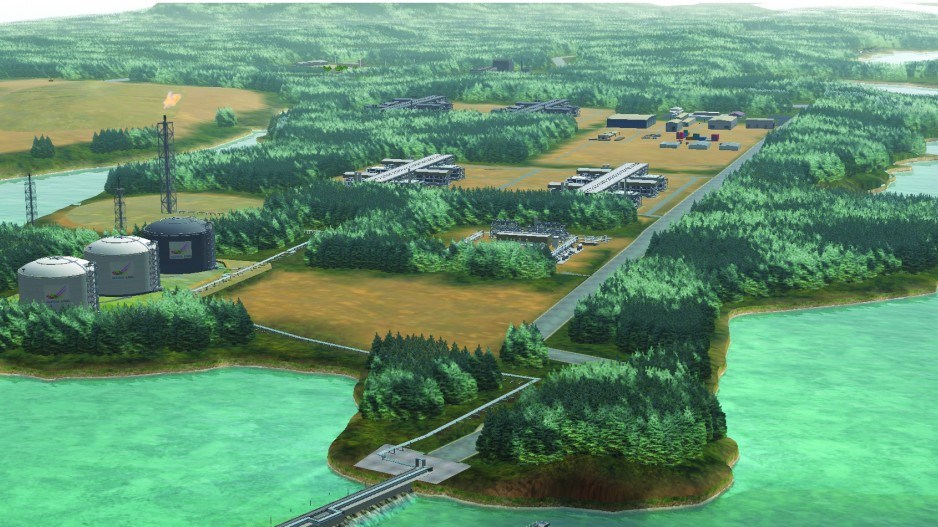And the overwhelming consensus of the 1,168 citizens from across Canada and around the world who submitted comments to the B.C. Environmental Assessment Office (EAO) is that they don’t want the LNG project in their backyard – or anyone else’s.
Last month, after pausing so the proponent, Nexen Energy ULC, could respond to all submissions, the environmental review period resumed in mid-June.
Nexen is the former Alberta oil and gas company that was acquired in 2013 by CNOOC Ltd. (NYSE:CEO), a subsidiary of China National Offshore Oil Corp. (CNOOC), for $15 billion.
The Aurora LNG project is a joint venture between Nexen and Japan’s Inpex Corp., which owns a 40% stake in Nexen’s natural gas holdings in northeastern B.C.
In order to respond to all 1,168 submissions received from the public by the EAO, Nexen asked that a 180-day review period be paused at the 70-day mark on March 20. It resumed on June 12.
Thanks to the reach of social media, environmental groups have been able to prompt people from as far away as Madrid and Ireland to write to the EAO in opposition to the project.
While some of the submissions – like one from an engineer from Arkansas – are well informed and well argued, others are more like angry tweets. One resident from Pennsylvania argued for the project to be rejected “in the name of Jesus.”
“We’ve got these campaigns that are seeking specifically to change the mandate of our regulatory processes, which actually works very well today,” said Stewart Muir, executive director for Resource Works. “We’re seeing the will of our Parliament being disputed by those who have no stake in our society – who do not live in our country – who are part of a process to hijack the will of Canadians systematically.”
One hurdle that may have already been removed is opposition from the two key First Nations in Prince Rupert – the Lax Kw’alaams and Metlakatla – thanks to the path blazed by Petronas.
Both nations signed agreements with Petronas and the provincial government earlier this year that grant them land, cash and revenue sharing on the Petronas deal and associated pipelines. That agreement obliged the two First Nations to also support other LNG projects in the Prince Rupert area.
The biggest growth demand for LNG is in Asia, which may give the Chinese and Japanese companies building the project some advantage in terms of market access.
The Aurora LNG project is to cost $17 billion to $20 billion. Nexen puts the total capital costs of the entire project at $28 billion, which presumably includes the cost of a new pipeline.
Since the EAO project description doesn’t include a natural gas pipeline to bring gas from Nexen’s natural gas wells in northeastern B.C., it can only be assumed that an application to build a pipeline will come later. Nexen did not respond to interview requests.
Jihad Traya, manager of natural gas consulting for Solomon Associates LLC, which handled the company’s National Energy Board (NEB) application for an LNG export permit, said the company is likely hoping that Petronas will move forward on its project, which includes a pipeline.
“What their expectation is, is that much of the heavy lifting on particularly the pipeline will have already been done,” Traya said. “You’re going to get Petronas and Shell LNG. So there’s going to be a significant amount of activity once those two projects are sanctioned, or if they’re sanctioned.”
That could be a big “if.” Both Shell and Petronas have deferred final investment decisions, largely for market reasons and economics. But Petronas, in particular, now faces a new NDP government that is hostile to its project. While in opposition, the NDP formally opposed the project.
Traya believes no LNG plant in B.C. can be sanctioned now, unless the new NDP government considers scrapping the Liberals’ special LNG tax. That seems unlikely since the NDP criticized the tax as a sweetheart deal and a “giveaway.”
At current prices, the economics simply don’t work for B.C. LNG projects, especially now that Canadian projects are competing with American LNG producers and developers that don’t pay a special LNG tax, Traya said.
“The pressing issue is: can the LNG project sponsors have a very sobering conversation with the current government of the day in British Columbia to move forward?” Traya said.
He said B.C. missed the last window to time new LNG developers to lock in long-term contracts, which typically are for 20 years. The next window will open sometime after 2020, and it will be B.C.’s last chance to build an LNG industry, Traya said.
“You miss it, and you’re done.”




